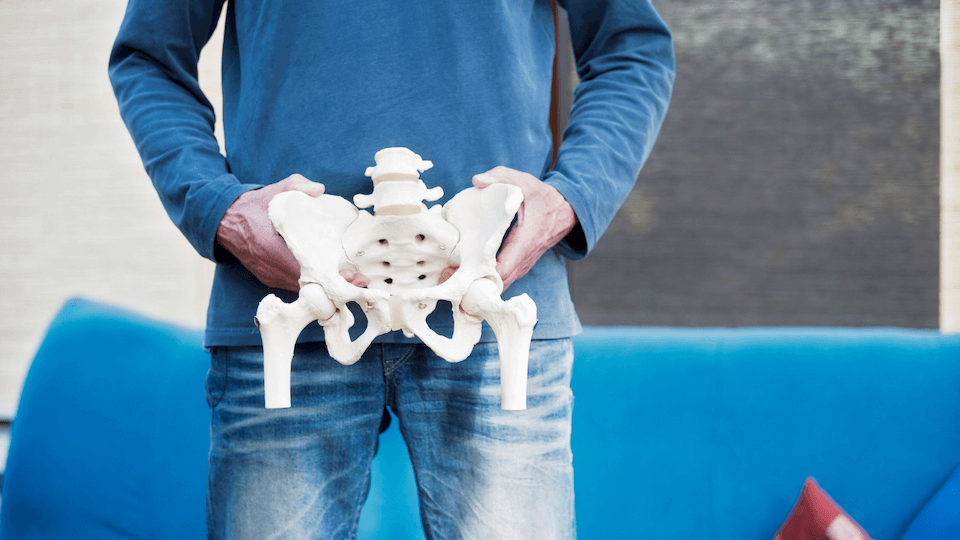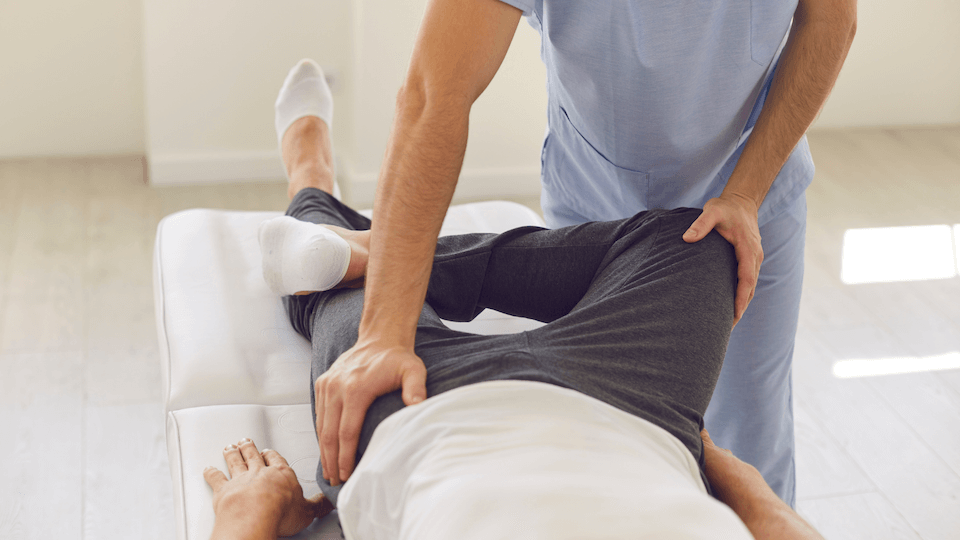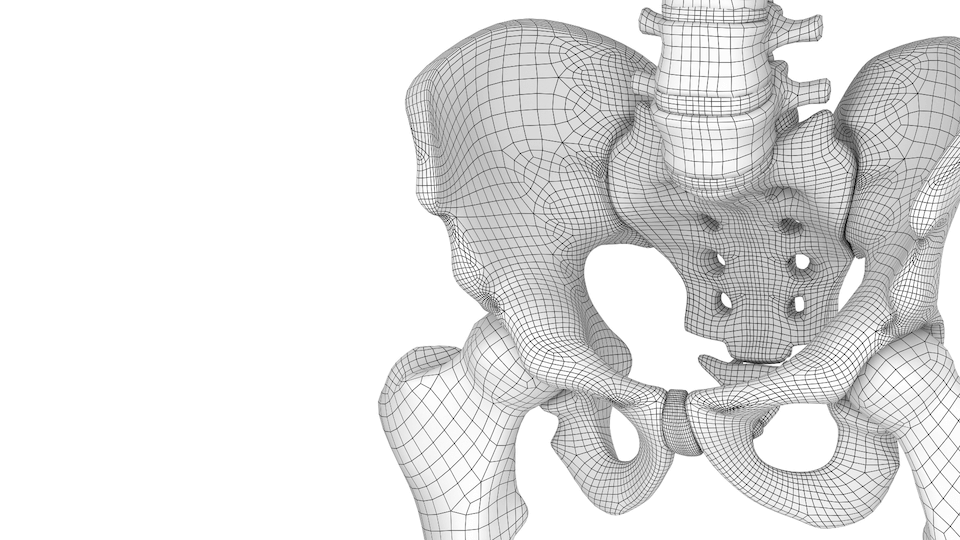Men's Pelvic Health Physical Therapy in Jacksonville, FL
Pelvic floor disorders are not exclusive to women. Men’s pelvic health is equally as important and complicated. Men have pelvic floor muscles and they can experience pelvic floor dysfunctions. A systematic review of the literature demonstrated that 44.7% of men around the world experience lower urinary tract symptoms. Yet, men are less likely than women to report their symptoms to health care professionals. Traditionally, men believe they must maintain their masculine disposition and hide their illnesses.
Bladder, bowel, and sexual dysfunction in men can significantly impact the quality of their life. Muscles and connective tissues support pelvic organs. Disorders such as incontinence, prolapse, or pelvic pain result when these structures fail.

Do Men Need Pelvic Health Physical Therapy?
Issues with men’s pelvic health is a result pelvic floor dysfunction, which results in the abnormal activity of the pelvic floor. This can interfere with the normal function of your bladder, bowel, and reproductive systems. Our physical therapists can help identify the most effective treatment to return the muscles and connective tissues that support these systems to optimal functioning.
- Urinary System. The urinary system includes the kidneys, ureters, bladder, and urethra.
- Digestive System. The digestive system includes all the organs between your mouth and anus: esophagus, liver, gallbladder, stomach, pancreas, large intestines, small intestines, appendix, rectum, and anus.
- Reproductive System. In men, the reproductive system includes the prostate, testes, and penis.
Our pelvic health physical therapists have specialized training to help you regain normal function. They are movement experts trained to relieve many pelvic floor dysfunctions while treating you as a whole person.

Common Men's Pelvic Health Problems
When pelvic floor muscles, ligaments, and fascia that support pelvic organs fail, you can experience many issues due to a dysfunctioning musculoskeletal system.
The following men’s pelvic health conditions can be addressed by treating pelvic floor dysfunctions due to muscles having too much or too little tone, loss of structural support, or a combination of conditions:
- Incontinence.
- Urinary incontinence (stress, urge, and mixed incontinence). Any loss of urine from pressure on the bladder, strong desire to urinate, or a combination of the two.
- Fecal incontinence. Leaking stool or gas unexpectedly.
- Urinary hesitancy. Starting and continuing your urine stream is difficult.
- Urinary frequency. Going to the bathroom more than 6-8 times a day.
- Constipation. Your stool is hard and you have less than three bowel movements in a week.
- Pelvic organ prolapse. Continuous bearing down or weak supportive structures could promote internal organs falling out of your rectum.
- Post-prostatectomy. Urinary incontinence is common after prostatectomy surgery.
- Rectal pain. Overactive pelvic floor muscles can cause anal or rectal pain.
- Abdominal pain. Bowel, bladder, or reproductive system dysfunction can create pain in the abdomen.
- Erectile dysfunction. Difficulty or inability to achieve and sustain an erection.
- Pelvic pain. Experiencing various negative or painful symptoms that are felt in your pelvis or lower abdomen.
- Painful intercourse. The medical term is dyspareunia, and pain is experienced just before, during, or after penetration.
- Hip pain. Pelvic floor muscle dysfunction can refer pain in your hips, low back, and tailbone.
Causes Of Men's Pelvic Health Issues
Your pelvic floor muscles work in synergy or as a team to create a desired movement and response. Dysfunction occurs when communication fails between your core muscles, including your abdominal muscles, low back muscles, hip muscles, and diaphragm.
Completing your usual daily activities will become challenging when your muscles are not working together. This will not necessarily always lead to pain, so it is crucial to identify the weakest link in your functional chain to decrease your risk of further injury.
Weakness in one part of your body can create overuse and overactive muscles, referring pain in another part of your body. Pain is a warning sign that your brain gives you to address a failing system.
Our pelvic health physical therapists can evaluate muscles directly by internal or external assessment. They can also visually assess the function of your core and pelvic floor muscles.
There are several reasons men can develop pelvic floor issues. Some include:
- Predisposing genetic factors
- Nerve damage
- Radiation therapy
- Radical surgery
- Constipation
- Urinary tract infections
- Chronic cough
- Occupation
- Infection
- Smoking
- Medications
- Cancer
- Behavior
- Neurologic conditions
How To Improve Your Pelvic Health
Research shows that men are less likely to seek help to address health care. Many will delay their search until symptoms significantly impact their life. For instance, in one study, men reported symptoms of chronic pelvic pain after 87 months before a diagnosis was reached. The impact on their quality of life was comparable to that of a heart attack and diabetes.
After taking your medical and social history, our physical therapists will complete a thorough musculoskeletal examination. Then together, you can create a plan of care which can include internal or external treatments using:
- Prescribed exercises
- Manual therapy
- Biofeedback therapy
- Electrical stimulation

Our Pelvic Floor Physical Therapists Can Help
Our pelvic health physical therapists can help treat many men’s pelvic health disorders successfully. Your primary care physician may not know that a physical therapist can help. You can request a referral from your doctor or call our office for a consultation.
You will receive training programs and education to help you address your pelvic floor dysfunction and control bowel and bladder disorders. Your treatment plan may include:
- Home exercises
- Proper amounts of fluid-in and fluid-out
- Timing goals to hold, or refrain, from urinating
- Resisting going to the bathroom upon initial sensation to void
- Education on appropriate diets to decrease urge sensations
- How to regulate the frequency of voiding
- Keeping a voiding diary
- Joining support groups
If you are already experiencing symptoms, you’ve waited too long, but don’t let that stop you from finding help now. It’s never too late to start pelvic floor rehabilitation and receive the education you need to reduce or eliminate your symptoms. Contact us today and our responsive staff will let you know what your next steps for pelvic floor recovery are.
Our Services
- Abdominal, Bladder, Pelvic, Vaginal and Tailbone Pain
- Back and Sacroiliac (SI) Pain
- Chronic Constipation due to Outlet Obstruction
- Diastasis Recti Abdominus
- Leakage of Urine or Stool (Incontinence in Men and Incontinence in Women)
- Painful Intercourse
- Pelvic Organ Prolapse
- Post-Episiotomy/C-Section Pain
- Postpartum Physical Therapy
- Post-Pelvic Radiation Recovery
- Pregnancy Related Back/SI Pain
Pelvic Health Around The Web
- Why Every New Mom Needs Pelvic Physical Therapy
- Pelvic Floor Rehab for Erectile Dysfunction
- Understanding Pelvic Floor Dysfunction
- Treating Patients with Pelvic Floor Dysfunction
- How Women Can Heal After Childbirth
- Questions to ask your Pelvic Physical Therapist
- Painful Sex Solutions
- Common Pelvic Floor Rehab Misconceptions
- Pelvic Floor Rehab to Find Relief
- Core Pre-hab and Rehab
- Why isn’t my Doctor Telling Me About Pelvic Floor Physical Therapy?
